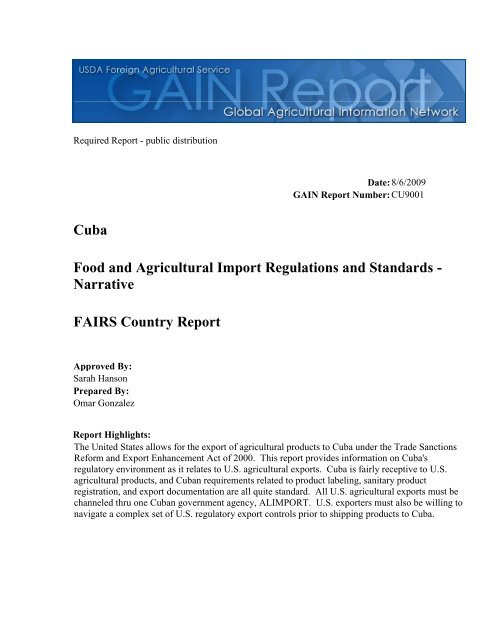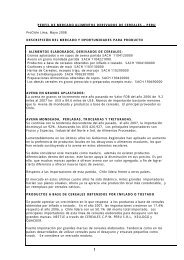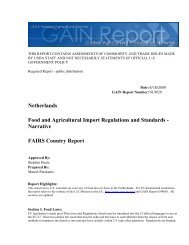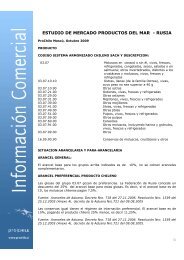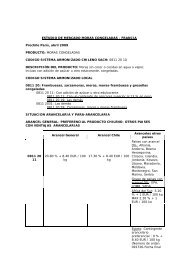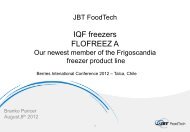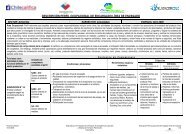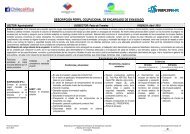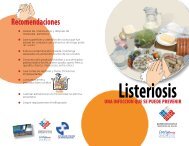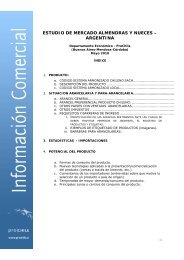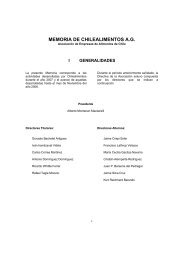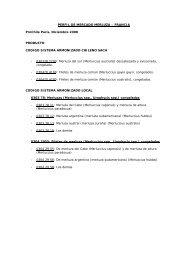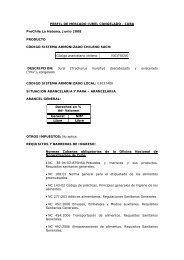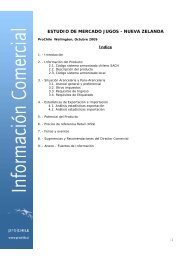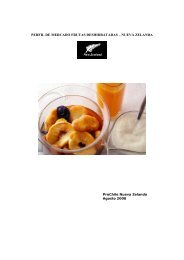Cuba Food and Agricultural Import Regulations ... - Chilealimentos
Cuba Food and Agricultural Import Regulations ... - Chilealimentos
Cuba Food and Agricultural Import Regulations ... - Chilealimentos
You also want an ePaper? Increase the reach of your titles
YUMPU automatically turns print PDFs into web optimized ePapers that Google loves.
Required Report - public distribution<br />
<strong>Cuba</strong><br />
Date: 8/6/2009<br />
GAIN Report Number: CU9001<br />
<strong>Food</strong> <strong>and</strong> <strong>Agricultural</strong> <strong>Import</strong> <strong>Regulations</strong> <strong>and</strong> St<strong>and</strong>ards -<br />
Narrative<br />
FAIRS Country Report<br />
Approved By:<br />
Sarah Hanson<br />
Prepared By:<br />
Omar Gonzalez<br />
Report Highlights:<br />
The United States allows for the export of agricultural products to <strong>Cuba</strong> under the Trade Sanctions<br />
Reform <strong>and</strong> Export Enhancement Act of 2000. This report provides information on <strong>Cuba</strong>'s<br />
regulatory environment as it relates to U.S. agricultural exports. <strong>Cuba</strong> is fairly receptive to U.S.<br />
agricultural products, <strong>and</strong> <strong>Cuba</strong>n requirements related to product labeling, sanitary product<br />
registration, <strong>and</strong> export documentation are all quite st<strong>and</strong>ard. All U.S. agricultural exports must be<br />
channeled thru one <strong>Cuba</strong>n government agency, ALIMPORT. U.S. exporters must also be willing to<br />
navigate a complex set of U.S. regulatory export controls prior to shipping products to <strong>Cuba</strong>.
Section I. <strong>Food</strong> Laws:<br />
This report was prepared by the Caribbean Basin <strong>Agricultural</strong> Trade Office of the USDA/Foreign<br />
<strong>Agricultural</strong> Service in Miami, Florida for U.S. exporters of domestic food <strong>and</strong> agricultural products.<br />
While every possible care was taken in the preparation of this report, information provided may not<br />
be completely accurate either because policies have changed since its preparation, or because clear<br />
<strong>and</strong> consistent information about these policies was not available. It is highly recommended that<br />
U.S. exporters verify the full set of import requirements with their foreign customers, who are<br />
normally best equipped to research such matters with local authorities, before any goods are shipped.<br />
FINAL IMPORT APPROVAL OF ANY PRODUCT IS SUBJECT TO THE IMPORTING<br />
COUNTRY’S RULES AND REGULATIONS AS INTERPRETED BY BORDER OFFICIALS AT<br />
THE TIME OF PRODUCT ENTRY.<br />
The United States has become <strong>Cuba</strong>’s largest supplier of agricultural goods in a matter of only a few<br />
years, with U.S. agricultural fish <strong>and</strong> forestry exports totaling nearly $700 million in 2008. This<br />
trade underscores <strong>Cuba</strong>’s dependence on imports of agricultural products to satisfy its domestic food<br />
needs, as well as supply its tourism sector, the country’s largest industry. <strong>Import</strong>s account for an<br />
estimated 84 percent of <strong>Cuba</strong>’s food supplies according to <strong>Cuba</strong>n government reports.<br />
The government-operated Empresa <strong>Cuba</strong>na <strong>Import</strong>adora de Alimentos (ALIMPORT) is the sole<br />
buying agency for U.S. agricultural products. ALIMPORT negotiates for client <strong>Cuba</strong>n entities <strong>and</strong><br />
h<strong>and</strong>les all purchasing, documentation <strong>and</strong> logistics. Other <strong>Cuba</strong>n agencies may import from non-<br />
U.S. sources, but in the case of the United States, ALIMPORT is the exclusive negotiating <strong>and</strong><br />
procurement party. The Ministry of Agriculture is responsible for regulating imports of animals <strong>and</strong><br />
animal products, as well as imports of plants <strong>and</strong> plant products. Live animals <strong>and</strong> animal product<br />
imports are subject to regulations of Decree 137 of 1993. <strong>Import</strong>s of live plants <strong>and</strong> plant products<br />
are subject to regulations set forth in Resolution 366 of 1990 <strong>and</strong> Resolution 435 of 1994. Similarly,<br />
the <strong>Cuba</strong>n Ministry of Health is responsible for regulating imports of consumer-ready<br />
foods. Enforcement is carried out mostly at the port of entry where scrutiny can be intense <strong>and</strong> at<br />
the importer warehouse level. Since practically all retail establishments are state controlled<br />
enterprises, enforcement at the retail level is minimal at best. Overall enforcement in <strong>Cuba</strong> is not<br />
unlike that of in many Latin American countries, where lack of resources <strong>and</strong> other factors can<br />
undermine government efforts.<br />
USDA export certificates are required for bulk grain <strong>and</strong> meat products, particularly for fresh,<br />
frozen, <strong>and</strong> canned meats. U.S. exporters should keep in mind that as of the date of this report, the<br />
diplomatic status between the United States <strong>and</strong> <strong>Cuba</strong> did not allow USDA officials to contact<br />
<strong>Cuba</strong>n government officials. Therefore, we encourage U.S. exporters to work closely with the<br />
importer <strong>and</strong>/or the <strong>Cuba</strong>n government to fully verify import requirements for agricultural goods.<br />
Section II. Labeling Requirements:<br />
All food products are required to be labeled in Spanish. Multilingual labels are acceptable as long as<br />
Spanish is one of the languages used on the label.<br />
Following is the information required by <strong>Cuba</strong>n law on all prepackaged food product labels:
1. Name of the food product<br />
2. Country of origin<br />
3. Commercial br<strong>and</strong> name<br />
4. Name <strong>and</strong> address of the manufacturer<br />
5. Ingredients <strong>and</strong> additives<br />
6. Net content <strong>and</strong> drained weight<br />
7. Instructions for use<br />
8. Storage instructions<br />
9. Date of manufacture or lot number/code <strong>and</strong> expiration date<br />
In addition to the above m<strong>and</strong>atory labeling requirements, <strong>Cuba</strong>n authorities may also refer to<br />
internationally accepted Codex Alimentarius (Codex) st<strong>and</strong>ards if discrepancies with foreign labels<br />
exist. Codex, also known as the "food code," is a set of scientifically-based <strong>and</strong> globally-recognized<br />
st<strong>and</strong>ards, codes of practice, guidelines <strong>and</strong> recommendations for food products.<br />
St<strong>and</strong>ard U.S. product labels are generally acceptable. However, stick-on labels may be required to<br />
comply with the Spanish language requirement or any of the 9 labeling requirements listed above<br />
<strong>and</strong> which are not specified on the U.S. product label. It is recommended that any stick-on labels be<br />
affixed on the product prior to arrival in <strong>Cuba</strong>, so that the product is fully compliant at the port of<br />
entry, <strong>and</strong> the customs clearance process is not delayed. As mentioned earlier, the port of entry is<br />
the main point of enforcement. In addition, while stick-on labels will fulfill import requirements in<br />
the short term, U.S. companies seeking to export food products to <strong>Cuba</strong> over the long run should<br />
label their products according to <strong>Cuba</strong>n requirements without the use of stick-on labels (to avoid any<br />
possible complications at the port of entry).<br />
<strong>Cuba</strong>n regulations do not specifically address labeling requirements for samples or institutionalpacked<br />
products for the food service industry. However, in the case of institutional packed products,<br />
health authorities normally do not expect to see all the information required on labels of retail<br />
products. The boxes or cases in which institutional products are shipped must be labeled with the<br />
name or description of the product <strong>and</strong> with the product size. The products themselves should be<br />
individually labeled with the same information as well. However, given that the end use of<br />
institutional packed products cannot always be guaranteed, it is recommended that they be labeled<br />
the same as retail products when possible.<br />
<strong>Cuba</strong> has no specific st<strong>and</strong>ards regarding irradiated food products. U.S. st<strong>and</strong>ards on this subject are<br />
acceptable.<br />
Section III. Packaging <strong>and</strong> Container <strong>Regulations</strong>:<br />
<strong>Cuba</strong> has no special Municipal Waste Disposal Laws or product recycling regulations. The<br />
manufacturer has the flexibility to use any packaging material as long as it is acceptable for use with<br />
food products. PVC <strong>and</strong> similar materials are fully acceptable in <strong>Cuba</strong>.<br />
Section IV. <strong>Food</strong> Additives <strong>Regulations</strong>:<br />
<strong>Cuba</strong>n law does not cite any major restrictions on additives. Thus, if the additive is recognized as<br />
being suitable for human consumption, particularly by Codex st<strong>and</strong>ards, it is considered acceptable<br />
by the <strong>Cuba</strong>n Ministry of Health.
U.S. exporters can obtain a complete list of additives that are acceptable by the <strong>Cuba</strong>n Ministry of<br />
Health directly from the Ministry’s Institute of Nutrition <strong>and</strong> <strong>Food</strong> Safety listed in Appendix I. U.S.<br />
exporters wishing to introduce a food product into <strong>Cuba</strong> containing a new additive, should contact<br />
the above specified agency <strong>and</strong> be prepared to submit the proper documentation/samples for<br />
scientific analysis prior to approval.<br />
Section V. Pesticides <strong>and</strong> Other Contaminants:<br />
The Ministry of Health is the agency charged with regulating pesticide/contaminant residues in<br />
foodstuffs. The Ministry uses its own list of approved products <strong>and</strong> acceptable tolerance levels for<br />
each. U.S. exporters may obtain a copy of such list by contacting the Ministry’s Institute of<br />
Nutrition <strong>and</strong> <strong>Food</strong> Safety. As a general rule of thumb, Codex maximum residue limits are<br />
acceptable for most foodstuffs. The Ministry of Health will remove a pesticide/contaminant<br />
suspected of affecting the food supply or producing illness to conduct the proper analysis <strong>and</strong><br />
determine its impact on the consumer.<br />
Section VI. Other <strong>Regulations</strong> <strong>and</strong> Requirements:<br />
U.S. exporters should ascertain whether their products will require a zoosanitary import permit (for<br />
animal products) or a phytosanitary import permit (for plant products) prior to exporting any<br />
agricultural product to <strong>Cuba</strong>. These permits, issued by the <strong>Cuba</strong>n Ministry of Agriculture, are<br />
normally obtained by the importer. The <strong>Cuba</strong>n government requires the appropriate zoo/phytosanitary<br />
import permit from the importing party before any trade contract is executed. In order to<br />
obtain such permits, the following is usually required:<br />
1. Commercial name of the product;<br />
2. Scientific name of the product (if applicable);<br />
3. Use of the product;<br />
4. Method of transportation into <strong>Cuba</strong>;<br />
5. Country of origin; <strong>and</strong><br />
6. Country from which the product is being delivered to <strong>Cuba</strong>.<br />
In the case of meat products, a visit by a <strong>Cuba</strong>n Ministry official to the farm <strong>and</strong>/or processing<br />
facility from which the products originate may be required prior to granting a zoosanitary import<br />
permit. Any plant product posing a risk to plant health will require a phytosanitary import<br />
permit. Such is the case for live plants or parts of plants, seeds, animal feeds, forestry products,<br />
products for industrial use such as cotton, tobacco, <strong>and</strong> medicinal plants <strong>and</strong> herbs. For the most<br />
part, processed consumer-ready food products are not subject to such requirements by the Ministry<br />
of Agriculture. However, U.S. exporters are urged to verify the need for any sanitary permits from<br />
the Ministry of Agriculture.<br />
Also, all U.S. exporting companies must be registered with the government of <strong>Cuba</strong> prior to<br />
shipping any products to <strong>Cuba</strong>. Procedures have been streamlined <strong>and</strong> consist of sending the<br />
following documentation to ALIMPORT (see Appendix I for contact information):<br />
1. Company name, address, short history, officers, <strong>and</strong> any other information demonstrating bona<br />
fides of the exporting company.
2. Technical specifications of the product(s).<br />
3. Certificate of free sale<br />
4. Phytosanitary or health certificate<br />
Prior to shipping of any U.S. agricultural products to <strong>Cuba</strong>, U.S. exporters must also register their<br />
products with the Institute of Nutrition <strong>and</strong> <strong>Food</strong> Safety, a dependency of the <strong>Cuba</strong>n Ministry of<br />
Public Health. Because ALIMPORT is the sole buying agency for U.S. products, they usually<br />
facilitate the product registration procedure with the Institute of Nutrition <strong>and</strong> <strong>Food</strong> Safety. The<br />
following is required for purposes of sanitary product registration:<br />
1. Three (3) samples of the product<br />
2. Certificate of origin<br />
3. Phytosanitary or health certificate<br />
4. Certificate of free sale<br />
5. Packing list<br />
6. Non-commercial invoice indicating either “no commercial value” or a negligible value of less that<br />
$20.<br />
There are no requirements for samples sizes/quantities for testing. However, U.S. exporters should<br />
use common sense in providing samples which are ample enough for laboratory analysis.<br />
Registration usually takes about 15 days from the time that all the documents <strong>and</strong> samples have been<br />
received.<br />
The U.S. Department of Commerce’s Bureau of Industry <strong>and</strong> Security (BIS) regulates exports to<br />
<strong>Cuba</strong>. Any person seeking to ship any goods, including samples, from the United States to <strong>Cuba</strong><br />
directly or indirectly, must first obtain authorization from BIS. Contact information for BIS can be<br />
found in Appendix II.A.<br />
Traveling to <strong>Cuba</strong> to transport product samples is possible, but it can also prove cumbersome. The<br />
U.S. Treasury Department’s Office of Foreign Assets Control (OFAC) administers the <strong>Cuba</strong>n Assets<br />
Control <strong>Regulations</strong> that regulate travel to <strong>Cuba</strong> <strong>and</strong> use of dollars by travelers in <strong>Cuba</strong>. Contact<br />
information for OFAC can also be found in Appendix II.A.<br />
Travelers carrying food samples into <strong>Cuba</strong> are required to declare the products to <strong>Cuba</strong>n<br />
Customs. For products subject to special import requirements (i.e. meat products), Customs may<br />
request additional authorization/documentation by the appropriate regulatory agency. As a general<br />
rule of thumb, the declared value of the merch<strong>and</strong>ise should read "No Commercial Value" in the<br />
case of samples. Customs rulings involving decisions taken against travelers or their luggage may<br />
be appealed. Initial claims should be made to the Chief of the Customs unit where the ruling was<br />
originally made. Claims can be escalated to the next highest level if need be.<br />
Although compliance with health st<strong>and</strong>ards is verified mostly at the port of entry <strong>and</strong> at the importer<br />
warehouse level, the <strong>Cuba</strong>n government does exercise some control, albeit on a very limited basis, at<br />
the retail level. When r<strong>and</strong>om inspections by health officials uncover irregularities such as spoiled<br />
product or product past its expiration, the product is usually confiscated. Store managers may be
penalized depending on the severity of the violation. The same applies at the wholesale level, except<br />
in this case the scrutiny is more intense. At the wholesale level the penalties for violations are also<br />
higher. In addition to product confiscation <strong>and</strong> fines, penalties may also include total removal of the<br />
product from the isl<strong>and</strong> <strong>and</strong> temporary suspension of import privileges for the particular item in<br />
question.<br />
Section VII. Other Specific St<strong>and</strong>ards:<br />
For information related to <strong>Cuba</strong>’s requirements for meat products exported from the United States,<br />
see USDA’s <strong>Food</strong> Safety <strong>and</strong> Inspection Service’s Export Library<br />
(www.fsis.usda.gov/<strong>Regulations</strong>_&_Policies/<strong>Cuba</strong>_Requirements/index.asp).<br />
For information on <strong>Cuba</strong>’s requirements for live animals exported from the United States, see<br />
USDA’s Animal <strong>and</strong> Plant Health Inspection Service website<br />
(www.aphis.usda.gov/regulations/vs/iregs/animals/animal_cuba.shtml).<br />
Information on exporting animal products to <strong>Cuba</strong> such dairy products <strong>and</strong> pet foods can be found<br />
at http://www.aphis.usda.gov/regulations/vs/iregs/products/product_cuba.shtml.<br />
Vitamins <strong>and</strong> nutritional products are considered pharmaceutical in nature, <strong>and</strong> they are not sold in<br />
supermarkets or retail food stores. These types of products are sold in pharmacies only.<br />
Section VIII. Copyright <strong>and</strong>/or Trademark Laws:<br />
All trademarks <strong>and</strong> br<strong>and</strong> names registered in <strong>Cuba</strong> are protected under <strong>Cuba</strong> law. Trademark<br />
registration with the <strong>Cuba</strong>n Office of Intellectual Property is voluntary. U.S. exporters shipping<br />
their products to <strong>Cuba</strong> are advised to make every effort to register their trademarks <strong>and</strong> br<strong>and</strong> names<br />
in <strong>Cuba</strong> in order to obtain protection against infringement. A trademark registration is valid for 10<br />
years <strong>and</strong> may be renewed indefinitely for successive ten year periods. U.S. exporters should be<br />
aware that although they may own the trademark for their product, this does not necessarily prevent<br />
someone else from registering it in <strong>Cuba</strong>. Legally established firms in <strong>Cuba</strong>, domestic <strong>and</strong> foreign,<br />
can register a trademark thru their legal representative, a designated representative, or an official<br />
agent (see Appendix II.B for a list of such agents). Foreign firms not legally established in <strong>Cuba</strong><br />
must conduct all business with the <strong>Cuba</strong>n Office of Intellectual Property thru an official agent. For<br />
further information on the trademark registration process, U.S. exporters should consult with an<br />
official agent.<br />
Applicable laws governing trademark registration include:<br />
1. Decree No. 68: Inventions, Scientific Discoveries, Industrial Models, Trademarks <strong>and</strong><br />
Denominations of Origin (May 14, 1983);<br />
2. Decree No. 160: Patent Applications concerning the Pharmaceutical <strong>and</strong> <strong>Agricultural</strong> Chemical<br />
Products (June 9, 1995);<br />
3. Decree No. 203: Trademarks <strong>and</strong> Other Distinctive Signs (December 24, 1999);<br />
4. Decree No. 228: Designation of Origin <strong>and</strong> Geographical Indications (February 22, 2002).
According to statistics from the <strong>Cuba</strong>n Office of Intellectual Property, from 200 to 2008, over<br />
24,000 trademark applications were received. Eighty five percent of these trademark applications<br />
were foreign. A large number of U.S. companies have already registered their trademarks <strong>and</strong> br<strong>and</strong><br />
names for many of the well established <strong>and</strong> recognizable U.S. food products.<br />
Section IX. <strong>Import</strong> Procedures:<br />
An importer begins the customs clearance process by submitting a customs merch<strong>and</strong>ise declaration.<br />
This declaration must be accompanied by the following documents:<br />
1. Shipping documents (i.e. original bill of lading, export certifications were applicable, etc.)<br />
2. Commercial invoice (original)<br />
3. Packing list (original)<br />
4. Certificate of Origin<br />
5. Phytosanitary <strong>and</strong> fumigation certificates in the case of wood<br />
All documents must be translated into Spanish. <strong>Cuba</strong>n Customs offers some leeway in terms<br />
of documentation. For instance, Proforma invoices are temporarily accepted. <strong>Import</strong>ers are also<br />
allowed to submit Customs declarations in advance of shipment arrivals, <strong>and</strong> make temporary or<br />
incomplete declarations when all the information necessary for clearance is not readily<br />
available. However, a commitment to submit a complete declaration <strong>and</strong> all the remaining<br />
documentation is required.<br />
Shipments are inspected <strong>and</strong> cleared at three different levels. At the first level, merch<strong>and</strong>ise goes<br />
through any one of three channels: green, orange or red. In the green channel, neither the documents<br />
nor the merch<strong>and</strong>ise are inspected. In the orange channel, the documents are reviewed to determine<br />
if a physical inspection of the merch<strong>and</strong>ise is required. In the red channel, clearance is granted only<br />
after the merch<strong>and</strong>ise has been physically inspected. According to <strong>Cuba</strong>n Customs, 90 percent of all<br />
shipments move through the green channel in the first stage. In the second clearance level, the<br />
documentation is reviewed again to determine if any errors in classification, valuation, or duty<br />
assessment may exist.<br />
Customs may apply administrative sanctions to any importer or customs agents found to be<br />
negligent or to exercise malicious intent. The third <strong>and</strong> final level of clearance involves post<br />
clearance inspections, which may take place up to five years after the merch<strong>and</strong>ise is imported into<br />
the country.<br />
We recommend that U.S. exporters hire a licensed Customs Agent in order for the customs clearance<br />
process to flow smoothly (see Appendix II.B for a list of accredited <strong>Cuba</strong>n Customs<br />
Agents). Customs clearance time may vary depending on the volume of cargo entering <strong>Cuba</strong> at any<br />
given time, <strong>and</strong> the number of documents required for specific merch<strong>and</strong>ise. The entire process may<br />
take one to three weeks depending on the effectiveness of the Customs Broker. Scrutiny of the<br />
import process can be quite intense <strong>and</strong> time consuming. Information contained in the Bill of<br />
Lading <strong>and</strong> pertaining to the consignee must also be complete <strong>and</strong> accurate. Discrepancies in this<br />
regard will most likely delay the clearance process.<br />
Decisions by Customs officials to reject merch<strong>and</strong>ise may be appealed. Depending on the grounds
for rejection, the head of the Customs Department or the Minister of Health will have the final say<br />
on whether or not merch<strong>and</strong>ise can be imported into the country.<br />
Applicable laws governing Customs procedures include:<br />
1. Decree No. 124: Customs Duties of the Republic of <strong>Cuba</strong> (October 1990);<br />
2. Decree No. 162: Customs Law of the Republic of <strong>Cuba</strong> (May 1996)<br />
3. Decree No. 207: Customs Administrative Infractions (May 1996)<br />
<strong>Cuba</strong> uses the nomenclature of the harmonized system up to 8 digits. Duties for most favored<br />
nations (WTO members <strong>and</strong> those with bilateral agreements with <strong>Cuba</strong>) average 10.7 percent <strong>and</strong><br />
for all others, including the United States, duties do not exceed 17 percent in most cases. Raw<br />
materials carry a duty of 5 to 15 percent. Over 90 percent of subheadings have a duty of less than 15<br />
percent <strong>and</strong> only 8 percent of subheadings have a duty above 20 percent.<br />
Appendix I. Government Regulatory Agency Contacts:<br />
For general purchasing, documentation <strong>and</strong> logistics issues related to the importation of U.S.<br />
agricultural products:<br />
ALIMPORT – MID (<strong>Cuba</strong>n Agency for the <strong>Import</strong>ation of <strong>Food</strong>)<br />
Calle 8 No. 508<br />
e/5 y 5B<br />
Miramar, Playa<br />
La Habana, <strong>Cuba</strong><br />
Tel: 011 (537) 204-1274, 204-1395<br />
Fax: 011 (537) 204-1274<br />
For sanitary registration of food products <strong>and</strong> other food safety issues:<br />
Instituto de Nutrición e Higiene de los Alimentos (Institute of Nutrition <strong>and</strong> <strong>Food</strong> Safety)<br />
Ministerio de Salud Pública (Ministry of Public Health)<br />
Infanta No. 1158 entre Llinás y Clavel<br />
Centro de la Habana<br />
Ciudad de la Habana, <strong>Cuba</strong> CP 10300<br />
Tel: 011 (537) 878-1429, 878-5919, 870-0183<br />
Fax: 011 (537) 873-8313<br />
E-mail: inha@infomed.sld.cu<br />
For labeling <strong>and</strong> other st<strong>and</strong>ards:<br />
Oficina Nacional de Normalización (National St<strong>and</strong>ards Office)
Calle E No. 261 entre 11 y 13<br />
Vedado - La Habana 10400<br />
Tel: 011 (537) 830-0022<br />
Fax: 011 (537) 836-8048<br />
E-mail: nc@ncnorma.cu<br />
For live animals <strong>and</strong> animal product import requirements:<br />
Instituto de Medicina Veterinaria (Institute of Veterinary Medicine)<br />
Calle 12 #355 E/ 15 y 17, Plaza de la Revolución<br />
Ciudad de la Habana, <strong>Cuba</strong> CP 10400<br />
Tel: 011 (537) 833-7077<br />
Fax: n/a<br />
E-mail: rbescofet@infomed.sld.cu, pssantos@infomed.sld.cu, egmerlo@infomed.sld.cu<br />
For plant <strong>and</strong> plant product import requirements:<br />
Centro Nacional de Sanidad Vegetal (National Plant Health Center)<br />
Ministerio de Agricultura (Ministry of Agriculture)<br />
Ayuntamiento No. 231<br />
e/ Lombillo y San Pedro, Plaza de la Revolución<br />
Ciudad de la Habana, <strong>Cuba</strong><br />
Tel: 011 (537) 879-1339, 870-0925, 881-5089<br />
Fax: 011 (537) 870-3277<br />
E-mail: cnsv@ceniai.inf.cu, director@sanidadvegetal.cu<br />
Other:<br />
Oficina <strong>Cuba</strong>na de la Propiedad Intelectual (<strong>Cuba</strong>n Office of Intellectual Property)<br />
Ministerio de Ciencia, Tecnología y Medio Ambiente (Ministry of Science, Technology & the<br />
Environment)<br />
Calle Picota No. 15, Entre Luz y Acosta<br />
Habana Vieja C.P. 10100<br />
Ciudad de la Habana, <strong>Cuba</strong><br />
Tel: 011 (537) 862-4379 / 861-3602 / 862-9771 / 866-0557 to 59<br />
Fax: 011 (537) 866-5610<br />
E-mail: ocpi@ocpi.cu<br />
Aduana General de la República de <strong>Cuba</strong> (<strong>Cuba</strong>n Customs Administration)<br />
Calle 6, Esquina a 39, Plaza Revolución<br />
Ciudad de la Habana, <strong>Cuba</strong> CP 10600<br />
Tel: 011 (573) 883-8282, 883-7575, 881-9732<br />
E-mail: publico@agr.aduana.cu<br />
Appendix II. Other <strong>Import</strong> Specialist Contacts:
A. U.S. Government Contacts<br />
Caribbean Basin <strong>Agricultural</strong> Trade Office Sarah Hanson, Director<br />
Foreign <strong>Agricultural</strong> Service E-mail: sarah.hanson@fas.usda.gov<br />
U.S. Department of Agriculture<br />
909 SE 1st. Ave Suite 720 Omar González, Mktg. Specialist<br />
Miami, FL 33131 E-mail: omar.gonzalez@fas.usda.gov<br />
Tel: (305) 536-5300<br />
Fax: (305) 536-7577 Graciela Juelle, Marketing Assistant<br />
E-mail: atocaribbeanbasin@fas.usda.gov E-mail: grace.juelle@fas.usda.gov<br />
Website: www.cbato.fas.usda.gov<br />
Office of Exporter Services<br />
Bureau of Industry <strong>and</strong> Security<br />
U.S. Department of Commerce<br />
Washington, D.C.<br />
Tel: (202) 482-4811<br />
Fax: (202) 482-2927<br />
Website: www.bis.doc.gov<br />
Office of Foreign Assets Control<br />
U.S. Department of the Treasury<br />
Treasury Annex<br />
1500 Pennsylvania Avenue, NW<br />
Washington, DC 20220<br />
Tel: (800) 540-6322<br />
Fax on Dem<strong>and</strong> Service: (202) 622-0077<br />
Website: www.treas.gov/offices/enforcement/ofac/index.shtml<br />
B. Non-U.S. Government Contacts<br />
Official agents specializing in trademark <strong>and</strong>/or sanitary registration:<br />
BUFETE INTERNACIONAL, CONSULTORES DE MARCAS Y PATENTES<br />
Casa Matriz<br />
5ta. Avenida No. 4002<br />
Esquina 40, Playa<br />
Ciudad de la Habana<br />
Tel: 011 (537) 204-5126, 204-5127, 204-5736, 204-5737<br />
Fax: 011 (537) 204-5125<br />
E-mail: marcas@bufeteinternacional.cu<br />
CLAIM, S.A.<br />
Lamparilla # 2. Lonja del Comercio. Oficina 6
Habana Vieja. Ciudad de La Habana. CP 10100<br />
Tel: 011 (537) 33-0743, 33-0755, 866-0743, 866-0755<br />
Fax: 011 (537) 33-0746<br />
E-mail: dirmapat@claim.com.cu & claim@claim.com.cu<br />
CONSULTORIA JURIDICA INTERNACIONAL<br />
Calle 16 No. 314, entre 3ra y 5ta. Avenida, Miramar<br />
Playa, Ciudad de La Habana<br />
Teléfonos: (537) 204-2490, 204-2469<br />
Fax: (537) 204-2303<br />
E-mail: cji@cji.co.cu<br />
LEX, S.A. SERVICIOS JURIDICOS DE MARCAS Y PATENTES<br />
Calle 1ra No. 1001, Esquina 10, Miramar<br />
Playa, Ciudad de la Habana<br />
Tel: 011 (537) 204-9093<br />
Fax: 011 (537) 204-9533<br />
E-mail: lexsa@lex-sa.cu<br />
BUFETE ESPECIALIZADO<br />
Calle 23 No. 501, Esquina a J. Vedado, Plaza de la Revolucion<br />
Ciudad de la Habana<br />
Tel: 011 (537) 832-6813, 832-6024, 833-2159<br />
E-mail: ania.bes@onbc.cu & besnet@cenial.inf.cu<br />
Accredited <strong>Cuba</strong>n customs agents:<br />
ADESA, S.A.<br />
Avenida del Puerto E/ LFCC y Calle Hacendados<br />
Habana Vieja, C. Habana<br />
Tel: 011 (537) 860-8581<br />
Fax: 011 (537) 860-8044<br />
AEROVARADERO, S.A.<br />
Carretera Wajay Km 1/2. Aijm.<br />
Boyeros, C. Habana<br />
Tel: 011 (537) 642-6009, 266-4120, 266, 4118<br />
Fax: 011 (537) 642-6009<br />
ALMACENES UNIVERSALES, S.A.<br />
Fabrica No. 54 E/ Aspuru y LFFC<br />
Habana Vieja, C. Habana<br />
Tel: 011 (537) 690-2359, 690-2367, 690-2370
ARANDIA, S.A.<br />
1ra #2416, Esq. 26, Miramar<br />
Playa, C. Habana<br />
Tel: 011 (537) 204-9420, 204-8781, 204-8702<br />
CONSIGNATARIA MARITIMA CARIBEÑA<br />
5ta Avenida, No. 4001 E/40 y 42<br />
Miramar, C. Habana<br />
Tel: 011 (537) 204-1226<br />
Fax: 011 (537) 204-1227<br />
CUBACONTROL, S.A.<br />
Calle Conill, Esq. 26 Plaza<br />
C. Habana<br />
Tel: 011 (537) 855-5720/24<br />
Fax: 011 (537) 855-5730, 855-5738<br />
CUBANACAN EXPRESS, S.A.<br />
5ta A, No. 6223 E/64 y 66<br />
Playa, C. Habana<br />
Tel: 011 (537) 204-9058, 204-2499<br />
Fax: 011 (537) 204-9058, 204-2499<br />
CUBAPACK INTERNATIONAL, S.A.<br />
22 # 4115 E/ 41 y 47<br />
Playa, C. Habana<br />
Tel: 011 (537) 204-1774<br />
Fax: 011 (537) 204-2226<br />
EMPRESA CONSIGNATARIA MAMBISA<br />
San Jose # 65 E/Prado y Zulueta<br />
Habana Vieja, C. Habana<br />
Tel: 011 (537) 862-2061 to 65 ext. 144, 862-7138<br />
Fax: 011 (537) 866-8111<br />
EMPRESA NACIONAL DE TRANSPORTE DEL COMERCIO<br />
Avenida Camilo Cienfuegos, #1965, E/23 y 24, Vista Alegre, 10 de Octubre<br />
C. Habana<br />
Tel: 011 (537) 878-1103<br />
EMPRESA CORREOS DE CUBA<br />
Desamparados No. 166 E/ Habana y Compostela<br />
Habana Vieja, C. Habana
Tel: 011 (537) 861-2667, 862-9560<br />
Fax: 011 (537) 861-2667<br />
EMPRESA DE SERVICIOS LOGISTICOS (LOGIDEX)<br />
Loma No. 674 E/ Lombillo y Colon, Plaza Revolucion<br />
C. Habana<br />
Tel: 011 (537) 855-5439<br />
MUSEO NACIONAL DE BELLAS ARTES<br />
Trocadero, S/N E/Zulueta y Monserrate<br />
Habana Vieja, C. Habana<br />
Tel: 011 (537) 861-3857, 863-9484 ext. 115 or 350<br />
Fax: 011 (537) 862-9626<br />
OTM CENTRAL CARGO<br />
Infanta # 1115 E/ Benjumeda y Santo Tomás<br />
Centro Habana, C. habana<br />
Tel: 011 (537) 877-5644 to 46, 879-5331<br />
Fax: 011 (537) 879-5331<br />
PALACIO DE CONVENCIONES<br />
148 Esq. 11, Siboney<br />
Playa, C. Habana<br />
Tel: 011 (537) 208-6111, 208-5312<br />
SERVITALLY<br />
Desamparados S/N Esq. Compostela<br />
Habana Vieja, C. Habana<br />
Tel: 011 (537) 862-1780, 862-1400<br />
Fax: 011 (537) 66-9138<br />
TECNOTEX<br />
Avenida del Puerto, Edificio "La Marina" E/Justiz y Obrapia<br />
Habana Vieja, C. Habana<br />
Tel: 011 (537) 861-5526, 869-5763, 869-5763<br />
Fax: 011 (537) 861-5526, 861-4658<br />
TRANSCARGO, S.A.<br />
San Pedro # 1<br />
Habana Vieja, C. Habana<br />
Tel: 011 (537) 860-8771, 862-7133<br />
Fax: 011 (537) 860-8626`<br />
Author Defined:
APPENDIX III. USEFUL WEBSITES/LINKS<br />
A. U.S. Government websites/links.<br />
1. http://www.fas.usda.gov/itp/cuba/cuba.asp<br />
USDA’s Foreign <strong>Agricultural</strong> Service website. This site contains the following information related<br />
to <strong>Cuba</strong>:<br />
A. Link to the FAS report on <strong>Cuba</strong>’s <strong>Food</strong> <strong>and</strong> <strong>Agricultural</strong> Situation (March 2008)<br />
B. Answers to frequently asked questions;<br />
C. General agricultural background;<br />
D. Commodity fact sheets <strong>and</strong> trade updates;<br />
E. U.S. foreign policy, travel guidance, <strong>and</strong> general background information;<br />
F. Export & trade guidance (including a list of agricultural commodities eligible for shipment to<br />
<strong>Cuba</strong>);<br />
G. Trade data; <strong>and</strong><br />
H. U.S. Legislation (Trade Sanctions Reform & Export Enhancement Act of 2000)<br />
2. http://www.bis.doc.gov/licensing/index.htm<br />
U.S. Department of Commerce, Bureau of Industry <strong>and</strong> Security website. In the “Frequently Asked<br />
Questions” section, click on “Trade Sanction Reform Act (TSRA)” for information on the licensing<br />
process <strong>and</strong> other useful information.<br />
3. http://www.treas.gov/offices/enforcement/ofac/programs/cuba/cuba.shtml<br />
U.S. Department of the Treasury, Office of Foreign Assets Control website. This site offers an<br />
overview of <strong>Cuba</strong>n assets control regulations <strong>and</strong> guidelines <strong>and</strong> information on the <strong>Cuba</strong> sanctions<br />
program, including information on rules related to use of dollars by travelers <strong>and</strong> permitted travel. A<br />
list of OFAC-Authorized Travel Service Providers can be found at:<br />
http://www.treas.gov/offices/enforcement/ofac/programs/cuba/cuba_tsp.pdf<br />
4. http://www.state.gov/r/pa/ei/bgn/2886.htm<br />
U.S. Department of State website. This site offers general background information on <strong>Cuba</strong>.<br />
5. http://havana.usinterestsection.gov<br />
U.S. Interests Section in Havana website. This site offers information on U.S. citizen services as<br />
well as USG <strong>and</strong> non-USG resources.<br />
6. https://www.cia.gov/library/publications/the-world-factbook/geos/cu.html<br />
Central Intelligence Agency’s World Factbook website. The World Factbook provides general<br />
information on <strong>Cuba</strong> <strong>and</strong> other countries around the world.<br />
B. Non-U.S. Government websites/links.<br />
The websites listed below are provided for the reader’s convenience; USDA does NOT in any way
endorse, guarantee the accuracy of, or necessarily concur with the information contained in these<br />
websites.<br />
1. http://lanic.utexas.edu/la/cb/cuba/<br />
University of Texas comprehensive listing of websites related to <strong>Cuba</strong>. English.<br />
2. www.nconline.cubaindustria.cu/entrada_english.asp<br />
<strong>Cuba</strong>n St<strong>and</strong>ards On-line. This site provides a catalog of <strong>Cuba</strong>n st<strong>and</strong>ards which can be searched<br />
for free. Downloading is available to subscribers for a fee. Spanish & English.<br />
3. www.aduana.co.cu<br />
<strong>Cuba</strong>n Customs Administration website. This site offers detailed information on Customs clearance<br />
legislation, requirements, procedures, <strong>and</strong> other useful information. Spanish & English Section.<br />
4. www.ocpi.cu<br />
<strong>Cuba</strong>n Office of Intellectual Property website. This site offers information on trademark/br<strong>and</strong><br />
name registration including a list of official agents specializing in trademark registration<br />
services. Spanish only.<br />
5. www.camaracuba.cu<br />
<strong>Cuba</strong>n Chamber of Commerce website. This site offers information on their trade services,<br />
directories, <strong>and</strong> numerous links to other useful <strong>Cuba</strong>n websites. Spanish only.<br />
APPENDIX IV. U.S. EXPORT REGULATIONS<br />
The following is intended as a brief summary of major U.S. regulations pertaining to agricultural<br />
products being exported to <strong>Cuba</strong> under the Trade Sanctions Reform <strong>and</strong> Export Enhancements Act<br />
of 2000 (TSRA). It is based on information contained on the U.S. Department of Commerce’s<br />
Bureau of Industry <strong>and</strong> Security (BIS) website <strong>and</strong> is not to be construed as a complete or definitive<br />
listing of U.S. export regulations pertaining to <strong>Cuba</strong>. For definitive information on the subject, U.S.<br />
exporters are advised to contact BIS (see Appendix II.A for contact information).<br />
1. License Exception <strong>Agricultural</strong> Commodities (AGR):<br />
The Bureau has created a new License Exception <strong>Agricultural</strong> Commodities (AGR) in section<br />
740.18 of the Export Administration <strong>Regulations</strong> (EAR). License Exception AGR authorizes<br />
exports <strong>and</strong> certain reexports of eligible agricultural commodities that are classified as EAR99 (i.e.,<br />
not listed on the Commerce Control List) to <strong>Cuba</strong>, subject to certain criteria <strong>and</strong> restrictions.<br />
Exporters must notify BIS <strong>and</strong> obtain confirmation from BIS that no agency of the U.S. Government<br />
that reviews these notifications objects to use of License Exception AGR prior to any export or<br />
reexport under authority of License Exception AGR. The proposed export must meet all of the<br />
criteria <strong>and</strong> restrictions listed below.
Exports <strong>and</strong> reexports must be made pursuant to a written contract <strong>and</strong> must take place within 12<br />
months of the signing of the contract, unless the shipment is a commercial sample or a donation, in<br />
which case the contract requirement does not apply. No exports may be made to a terrorist entity,<br />
including a Specially Designated Terrorist (SDT) or Foreign Terrorist Organization (FTO), a person<br />
denied export privileges by the Department of Commerce if the export would violate the terms of the<br />
denial order, or for use in weapons of mass destruction (WMD) programs (i.e., biological, chemical,<br />
nuclear warfare or missile proliferations activities). The Treasury Department's Office of Foreign<br />
Assets Control lists of SDTs <strong>and</strong> FTOs as part of the list of Specially Designated Nationals <strong>and</strong><br />
Blocked Persons. No U.S. owned or controlled foreign firm may export or reexport from a third<br />
country to <strong>Cuba</strong> a foreign produced agricultural commodity.<br />
2. TSRA Eligible <strong>Agricultural</strong> Commodities<br />
<strong>Agricultural</strong> commodities are defined in Section 102 of the <strong>Agricultural</strong> Trade Act of 1978 (7 U.S.C.<br />
02). For purposes of License Exception AGR, agricultural commodities include, but are not limited<br />
to, food, feed, fish, shellfish <strong>and</strong> fish products; beer, wine <strong>and</strong> spirits; soft drinks; livestock; fiber,<br />
including cotton, wool <strong>and</strong> other fibers; tobacco <strong>and</strong> tobacco products; wood <strong>and</strong> wood products,<br />
including lumber <strong>and</strong> utility poles; seeds; <strong>and</strong> reproductive materials such as fertilized eggs,<br />
embryos, <strong>and</strong> semen. A list of eligible agricultural commodities is available for review at the U.S.<br />
Department of Agriculture Web site (see Appendix III). Vitamins, minerals, food additives <strong>and</strong><br />
dietary supplements, <strong>and</strong> bottled water are also considered to be agricultural commodities for the<br />
purposes of License Exception AGR. Some organic <strong>and</strong> inorganic fertilizers are eligible <strong>and</strong> some<br />
are not. The distinction is as follows: Dry fertilizers containing 15% or less ammonium nitrate are<br />
eligible for License Exception AGR. Dry fertilizers containing more than 15% ammonium nitrate<br />
are classified as Export Commodity Classification Number (ECCN) 1C997 <strong>and</strong> are not eligible for<br />
License Exception AGR. Liquid fertilizers are eligible for License Exception AGR regardless of the<br />
concentration of ammonium nitrate they contain. Some agricultural commodities are not eligible,<br />
such as: items on the Commerce Control List (CCL), including western red cedar <strong>and</strong> live horses;<br />
items on the U.S. Munitions List; items for use in weapons of mass destruction<br />
(WMD). <strong>Agricultural</strong> commodities do not include furniture even if made from wood; clothing;<br />
agricultural equipment (whether h<strong>and</strong> tools or motorized equipment); pesticides, insecticides, or<br />
herbicides; or cosmetics (unless derived entirely from plant materials).<br />
3. BIS' Prior Notification Procedures under License Exception AGR<br />
Before making any shipment under License Exception AGR, exporters must submit a notification to<br />
BIS <strong>and</strong> obtain confirmation that no agency has raised an objection to the use of License Exception<br />
AGR for the transaction described in the notification. BIS informs exporters within 12 business days<br />
from the date the notice is registered in BIS's electronic database whether such objections have been<br />
raised. BIS's confirmation that no objections have been raised does not relieve parties to the<br />
transaction from the obligation to assure that they meet all of the requirements of License Exception<br />
AGR, other requirements of the Export Administration <strong>Regulations</strong> (EAR), <strong>and</strong> any other applicable<br />
law. The procedures for using this license exception are:<br />
a. Exporters must notify BIS prior to any export or reexport.<br />
b. Exporters provide this prior notification by submitting a completed BIS Multi-purpose
Application Form (BIS-748P) or electronically through BIS's Simplified Network Application<br />
Process Redesign (SNAP-R).<br />
Within two business days of the notification's registration in BIS's electronic database system, BIS<br />
will refer the notification electronically to the Departments of State, Defense, <strong>and</strong> other agencies, as<br />
appropriate, for review. Any reviewing agency that objects to the use of License Exception AGR<br />
must provide notice of such objection to BIS within nine business days of the referral. An agency<br />
may object for one or more of the following reasons:<br />
a. the commodity is not an agricultural commodity;<br />
b. the items are not EAR99;<br />
c. the export would violate the terms of a denial order;<br />
d. the recipient may promote international terrorism; or<br />
e. the transaction raises nonproliferation concerns.<br />
If any agency objects, BIS will convert the notification into a license application <strong>and</strong> process it<br />
under st<strong>and</strong>ard export license application procedures. An exporter may ship the goods after 12 days<br />
if no agency has raised an objection. Applicants may check the status of their notification or<br />
application via BIS' System for Tracking Export License Applications (STELA) at 202-482-2752<br />
using the "Z" number on the 748-P form or provided by SNAP. Applicants may not make the export<br />
without confirming via STELA that no agency has raised an objection.<br />
BIS also will notify the applicant in writing of the outcome of the interagency review.<br />
4. Commodity Classification Requirements<br />
Exporters must be sure that they are not attempting to use AGR as authority to export any item that<br />
is on the Commerce Control List (CCL). Only items classified as EAR99 are eligible for BIS'<br />
License Exception AGR or OFAC's expedited review procedures. EAR99 items are items that are<br />
subject to the Export Administration <strong>Regulations</strong>, but they are not specifically listed on the<br />
CCL. Exporters may need to include, with their notification or application, an official BIS<br />
commodity classification to confirm the classification of an item as EAR99, as specified in greater<br />
detail below.<br />
BIS is responsible for providing commodity classifications. Exporters may obtain a commodity<br />
classification by submitting a completed BIS' Multipurpose Application Form (BIS-748P) or<br />
electronically through BIS' Simplified Network Application Process Redesign (SNAP-R) indicating<br />
that they wish a commodity classification. See Section 748.3 of the Export Administration<br />
<strong>Regulations</strong> for more information. BIS has already determined that most items that meet the<br />
definition of agricultural commodity are classified as EAR99. This includes most of the items on the<br />
USDA’s Eligible Commodities List available from its Economic <strong>and</strong> Trade Sanctions Web page (see<br />
Appendix III). This means that items on this list do not require a commodity classification with three<br />
exceptions: live horses; western red cedar; <strong>and</strong> fertilizers. For these three types of agricultural<br />
commodities, BIS <strong>and</strong> OFAC require a BIS commodity classification for fertilizers, live horses or<br />
western red cedar prior to submission of a notification to BIS or a license application to OFAC, as
these agricultural commodities may be on the Commerce Control List.<br />
Further information, including answers to frequently asked questions on the TSRA, can be found on<br />
the BIS website at http://www.bis.doc.gov/licensing/index.htm.


